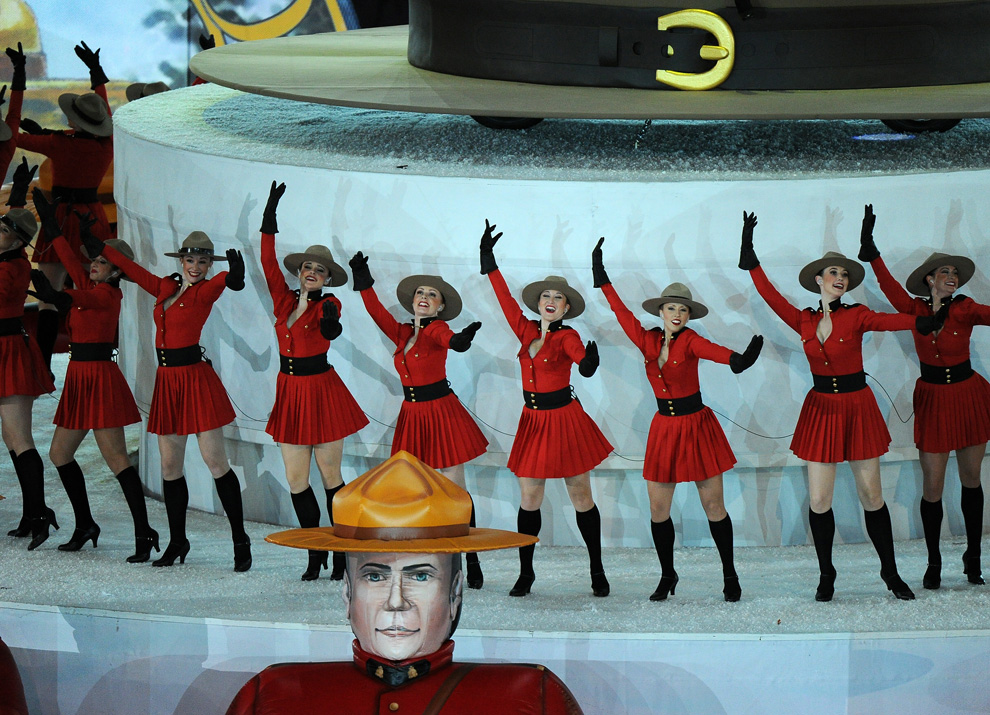Some Americans like to think that Canada is a progressive paradise–not to put too fine a point on it, they imagine Canada as being America without the craziness. You know, a place where you can drive the same car, sans road rage, or have all your favorite TV shows, movies, and music but not have to worry about society amusing itself to death. Canadians strive and shop just like Americans, but still are the soul of decency, tolerance, prudence, civility, and common sense.
Like this:

According to the caption at The Big Picture, “Entertainers dressed as Mounties perform during the closing ceremony of the 2010 Winter Olympics.” So that’s what they are: entertainers. And what about the elephant in the living room, by which I mean the giant Mounty cake? And speaking of Mounties, isn’t that other fine example of the Royal Canadian Mounted Police a Giant Cut-Out? Not just any nation could have mashed up the Rockettes and a Victorian greeting card, but Canada is not just any nation.
I get a kick out of this photograph, which can be read in either direction on the big question of Canadian exceptionalism (just like American exceptionalism, except nicer). On the on hand, we see the same ridiculous, over-the-top, mass pop aesthetics that we have come to expect from Olympic closing ceremonies, Super Bowl halftime shows, and the like. On the other hand, it is still so, well, what you would expect from a nation whose frontier hero was a policeman. That said, I want to side with the craziness and so cut back the myth of Canada the well-mannered America. Face it, they’re nuts, too.
I should quit there, but I there is another point to be made for our academic readers. Guy Debord’s Society of the Spectacle begins with the statement that “The spectacle is not a collection of images; rather, it is a social relation between people that is mediated by images” (paragraph 4). That important point is too easily overlooked, but it also lets Debord off a very big hook: what if a specific image or collection of images suggests a different social relation, or one intertwined with another? And what if Canada is doing the good work of providing a spectacle that can be read in either direction: as the epitome of fetishism and false consciousness aligned with the state, or as something that somehow gets close to that but ends up, well, more negotiable and not so threatening?
Look at this image again, and it’s all there: state power, the commodity fetish, the cult of the copy, separation celebrated, and gender ideology materialized. But more is there as well: in a word, it’s nuts, and obviously so; more important, it is so obviously a theater of duplication that you have to believe irony is in the wings. Excess may not be more of the same but rather one means for living within the spectacle. And come to think of it, perhaps Canada knows a thing or two about being regarded as a copy, but with a difference for the better.
Photograph by Robyn Beck/AFP-Getty Images.
Don’t quote me, I didn’t pay that much attention to the masses of bally-hoo encrusting the Olympics (I’m Canadian after all) but I think they imported an American or a Canadian ex-pat from Hollywood to produce these shows.
If they did such an import it had to have been from Hollywood in the 1930s …
Irony wasn’t just in the wings. The announcer said very clearly that the piece was embracing all the stereotypes. It was screamingly funny. The Mounties, btw, were inflatable not cut out, as were the beavers. The table-hockey players were cutouts though, and the canoes on the dancing voyageurs were probably also cutouts, something lightweight anyway. I did miss the igloos, I felt there should have been igloos, but other than that it covered most of the bases. I have yet to meet a non Canadian who got the joke.
As for who the director/producer/choreographer were, try http://www.vancouver2010.com/olympic-news/n/news/feature-stories/peeking-behind-the-scenes-of-the-olympic-opening-and-closing-ceremonies_39538Ir.html and http://www.tourismvancouver.com/visitors/vancouver/2010_olympics/article-detail?id=213
I watched these ceremonies with equal parts laughter and embarassment and enjoyed every minute. For Canadians, I think that whole spectacle (and, in many ways, the entire spectacle of the Vancouver Olympics) was an exercise in negotiating our social relations to each other, to the state/nation/history, and to the rest of the world by revelling in Canadiana.
In my memory, Canadians have always defined themselves by Canadian stereotypes, both by resisting and embracing them (I’m not sure how we manage to do both at the same time, but there you have it). I’m sure everybody in Canada remembers the Molson “I Am Canadian” commercials from the ’90s where “Joe Canadian” – a very polite young man wearing a flannel shirt – delivers an extensive monologue about what it means (or doesn’t mean) to be Canadian, touching on all the typical stereotypes (“I don’t live in an igloo!”, he exclaims at one point). And there’s another good one on right now for Tim Horton’s (a much-loved coffee shop franchise) where two Canadian fellas similarly deride and demonstrate the same stereotypes (“who does that, eh?” asks one, as he steps off his dogsled and heads into Tim’s to get his medium double-double and play Roll-Up-the-Rim).
The closing ceremonies were more of the same – a flood of Canadiana that gave Canadians a chance to reaffirm their “Canadianness” by both embracing and rejecting all of the stereotypes on display. As Kate notes, I think it was a bit of an in-joke, but from the Canadian audience’s perspective at least, I think it was very much as Bob notes above – an exercise in both fetishizing and negotiating a particular set of social relations (or identity) through those mediating images. Altogether, I thought it was pretty damn funny.
my mom has a coffe franchise near seattle and she earns a lot from it*;’